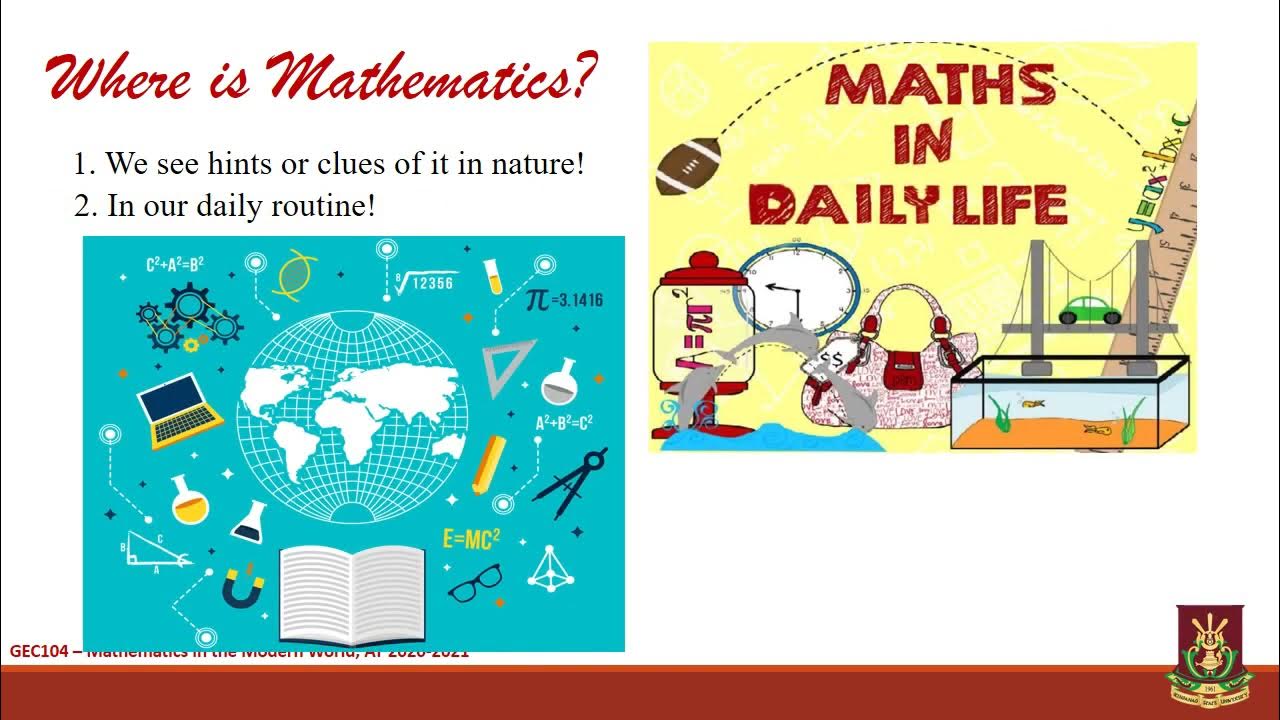Chapter 2: Nature's number by Ian Stewart
Summary
TLDRThis video script delves into the multifaceted nature of mathematics, highlighting its role beyond numbers to uncovering patterns and structures in the environment. It underscores mathematics as the language of science, exemplified by explaining the spiral shape of snails and the evolution of the eye through quantitative modifications. The script also touches on calculus's development for understanding change and the surprising utility of good mathematics in the real world. It discusses the predictability of celestial events versus the unpredictability of weather, and the fascinating stability of the solar system influenced by orbital resonances, showcasing mathematics' profound impact on our understanding of the universe.
Takeaways
- 🔢 Mathematics is not just about numbers; it's a systematic way of understanding patterns and structures in the environment.
- 🐌 Science uses mathematics as a language to explain phenomena, such as the spiral shape of snails, using variables like growth rate and eccentricity rate.
- 👀 A computer simulation by Nielsen and Pelger in 1994 showed that it's easier to estimate the number of generations to evolve an eye than other complex organs.
- 🌟 Calculus was developed to understand continuously changing quantities, with Newton's interest in instantaneous change stemming from his observations of gravity.
- 🌌 Good mathematics, regardless of its origin, often proves to be useful in the real world, from theories about the human mind to the idea that the universe is mathematically constructed.
- 🌞 Astronomers can predict lunar and solar eclipses, and the return of comets, by understanding the motion of celestial bodies.
- 🌊 The tides, primarily controlled by the positions of the sun and moon relative to the earth, can be predicted with mathematical models, unlike the inherently unpredictable weather.
- 🌐 Understanding the mechanisms of the solar system, such as orbital resonance, allows us to go beyond passive observation and comprehend the stability of celestial bodies.
- 🪐 Orbital resonance, where orbiting bodies reduce force through gravity due to related orbital periods, is a key dynamic in the solar system, influencing the distribution of asteroids.
- 🎶 The script concludes with a musical note, suggesting a harmonious or rhythmic aspect to the mathematical patterns and structures discussed.
Q & A
What is the broader concept of mathematics beyond just numbers?
-Mathematics is a systematic way of uncovering the rules and structures behind observed patterns, and then using those rules or structures to explain what's going on.
How does mathematics serve as the language of science?
-Mathematics conveys data to rationalize particular phenomena, such as explaining the spiral shape of a snail through variables like growth rate and eccentricity rate.
What is an example of how mathematics was used to understand biological evolution?
-Daniel Nielsen and Suzane Pelger used computer simulations to estimate the number of generations necessary to evolve an eye from a light-sensitive spot to a fully developed lens eye.
Why was calculus developed, and who were the key figures involved in its invention?
-Calculus was developed to understand continuously changing quantities. Sir Isaac Newton and the German mathematician Gottfried Wilhelm Leibniz independently invented this branch of mathematics to handle questions about rates of change.
What is the significance of good mathematics in the real world?
-Good mathematics, regardless of its source, often turns out to be useful in the real world, with theories suggesting this could be due to the structure of the human mind or the universe being built from mathematical principles.
How has mathematics helped in predicting astronomical events?
-By understanding the motion of heavenly bodies, astronomers could predict lunar and solar eclipses, the return of comets, and even locate asteroids that had passed out of observational contact with the sun.
What is the difference between predicting tides and weather using mathematics?
-Tides are mainly controlled by the position of the sun and moon relative to the Earth, making them more predictable. In contrast, weather has inherent unpredictability, making it much harder to predict using mathematical models.
How does understanding mathematics allow us to go beyond being passive observers?
-Understanding the mechanisms behind phenomena, such as the motion of celestial bodies, allows us to actively engage with and potentially manipulate these systems, rather than just observing them.
What is orbital resonance, and how does it affect the solar system's stability?
-Orbital resonance occurs when orbiting bodies reduce force through gravity, usually because their orbital periods are related. This resonance contributes to the stability of the solar system by influencing the dynamics of celestial bodies.
Why are there gaps in the asteroid belt between Mars and Jupiter?
-The gaps in the asteroid belt are due to resonance with Jupiter, which causes certain distances from the sun to have fewer asteroids as the gravitational influence of Jupiter disrupts their orbits.
Outlines

此内容仅限付费用户访问。 请升级后访问。
立即升级Mindmap

此内容仅限付费用户访问。 请升级后访问。
立即升级Keywords

此内容仅限付费用户访问。 请升级后访问。
立即升级Highlights

此内容仅限付费用户访问。 请升级后访问。
立即升级Transcripts

此内容仅限付费用户访问。 请升级后访问。
立即升级浏览更多相关视频
5.0 / 5 (0 votes)






